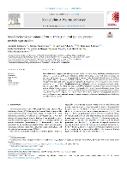Small-molecule activators of NRF1 transcriptional activity prevent protein aggregation

Author
Publication date
2025Published in
Biomedicine & PharmacotherapyVolume / Issue
183 (February)ISBN / ISSN
ISSN: 0753-3322ISBN / ISSN
eISSN: 1950-6007Metadata
Show full item recordCollections
This publication has a published version with DOI 10.1016/j.biopha.2025.117864
Abstract
Intracellular protein aggregation causes proteotoxic stress, underlying highly debilitating neurodegenerative disorders in parallel with decreased proteasome activity. Nevertheless, under such stress conditions, the expression of proteasome subunits is upregulated by Nuclear Factor Erythroid 2-related factor 1 (NRF1), a transcription factor that is encoded by NFE2L1. Activating the NRF1 pathway could accordingly delay the onset of neurodegenerative and other disorders with impaired cell proteostasis. Here, we present a series of smallmolecule compounds based on bis(phenylmethylen)cycloalkanones and their heterocyclic analogues, identified via targeted library screening, that can induce NRF1-dependent downstream events, such as proteasome synthesis, heat shock response, and autophagy, in both model cell lines and Caenorhabditis elegans strains. These compounds increase proteasome activity and decrease the size and number of protein aggregates without causing any cellular stress or inhibiting the ubiquitin-proteasome system (UPS). Therefore, our compounds represent a new promising therapeutic approach for various protein conformational diseases, including the most debilitating neurodegenerative diseases.
Keywords
proteasome, NRF1(NFE2L1), DDI2, NGLY1, Protein aggregates, Small molecules
Permanent link
https://hdl.handle.net/20.500.14178/2895License
Full text of this result is licensed under: Creative Commons Uveďte původ 4.0 International




